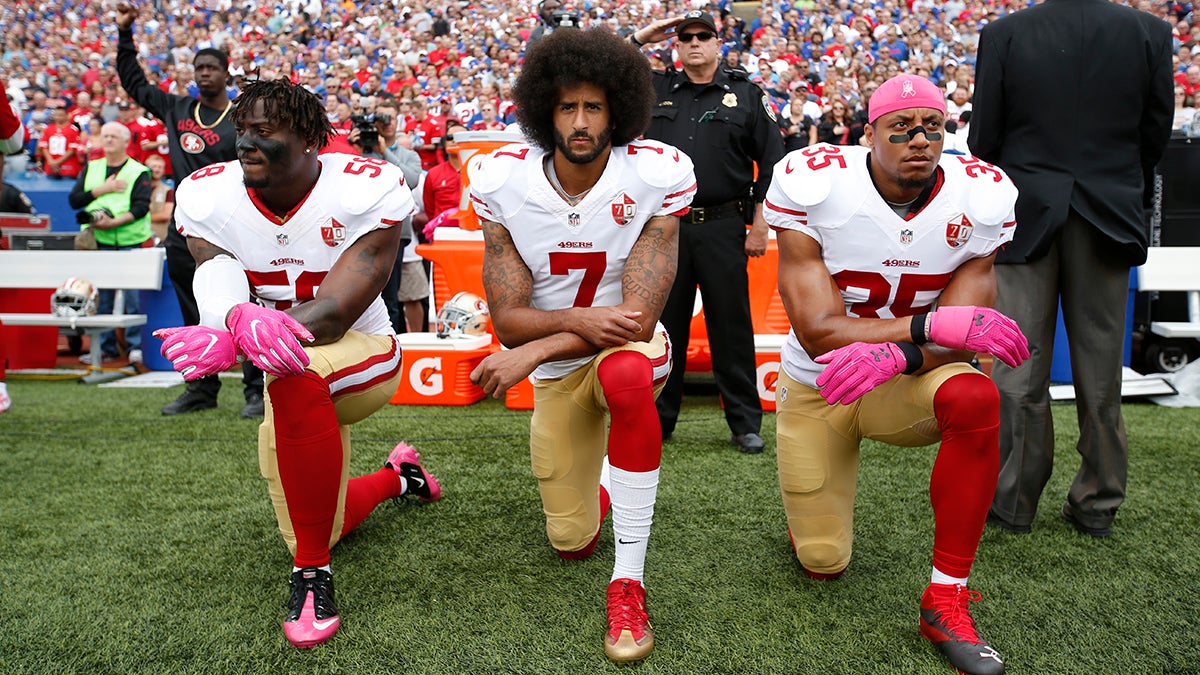Extending Kaepernick deal bold, controversial move by Nike

The move by Nike to extend the contract of their athlete endorser, Colin Kaepernick, is an aggressive and risky step in the highly competitive sports apparel world. For sure it is a bold move by Nike, but bolder than just keeping him under contract is building a whole new campaign around him focused on the 30th anniversary of their most successful campaign, “Just do it.”

Since this occurred I have been asked by many - Has this ever happened before? The first thought is that politics and a single athlete have not been so deeply intertwined in this modern era, so it could not have happened. For the legends in politics and sports it was different: Muhammad Ali had virtually no endorsements when he refused to be inducted into the U.S. military in 1967 and Arthur Ashe in his fight against South African apartheid, was not so out of the American mainstream to have his racquets and other endorsements disrupted. Think of endorsers who have been cut off before: Tiger Woods, Maria Sharapova, Michael Vick, Lance Armstrong. These athletes all missed out for non-political topics: domestic problems, drugs, dog fighting and PEDs.
The true uniqueness is beginning the campaign in the midst of the athlete's involvement in a political controversy. Endorsers came around to Ali once he was a beloved legend. The same is occurring for political protestors John Carlos and Tommie Smith on the 50th anniversary of their protest.
The one other time I recall a political tie was the brief And 1 sneaker company campaign with Latrell Sprewell nearly two decades ago. There Sprewell, who as a Portland Trailblazer wore wearing cornrows and famously choked his head coach, is heard saying, as his hair is being braided and the controversial Jimi Hendrix version of the national anthem is being played, “People say I’m the American Nightmare, I say, I’m the American Dream.”
This fit perfectly with the trash talking street ball imagery of the And 1 brand . It was a progression. For Nike, this is quite a distance away from “Just Do It” but we will see in time where this ends. The one big question, beyond the impact on Nike’s market (on day one both its stock and the stock of main competitor adidas were down, so no judgment yet), what conversation did Nike leadership have with the NFL? The two are long-term partners. Does the NFL have a national anthem policy resolution that will mesh with this Nike campaign? We will soon know the answer to that as well.
Kenneth L. Shropshire is the CEO of the Global Sport Institute and adidas Distinguished Professor of Global Sport as Arizona State University and Endowed Professor Emeritus at the Wharton School, University of Pennsylvania. Among his 13 books is Sport Matters: Leadership Power and the Quest for Respect in Sports.
A sampling of some of the reaction from Twitter:
Especially proud to be a part of the Nike family today. #justdoit pic.twitter.com/GAZtkAIwbk
— Serena Williams (@serenawilliams) September 4, 2018
I see a Tillman meme circulating to slam Nike/Kap. Just stop, people. You don’t know what you don’t know.
— Scott Fujita (@sfujita55) September 4, 2018
I don't see kneeling as disrespect for our armed forces or veterans. It is a statement about the discrimination, prejudices, and injustices that still age American Society. @Nike & @Kaepernick7 are on the right side of history. #TakeAKnee
— Wes Clark (@GeneralClark) September 5, 2018
A former NFL player, and Army Special Forces veteran stood with @Kaepernick7 when he knelt. "We take a knee to pray and propose to our wives. when people get knighted they take a knee, never really in history has kneeling been viewed as disrespectful." https://t.co/V9BgIoBqRS
— ABC7 News (@abc7newsbayarea) September 5, 2018
Stop exploiting Pat Tillman’s death.
Stop exploiting Pat Tillman’s death.
Stop exploiting Pat Tillman’s death.
Stop exploiting Pat Tillman’s death. https://t.co/6mTOzHiCuq— Donté Stallworth (@DonteStallworth) September 4, 2018
Maria Tillman told @brianstelter in September that Pat's service should "never be politicized in a way that divides us"https://t.co/8tYgHlWtaA
— Nathan McDermott (@natemcdermott) September 3, 2018
I’m just here to remind folks that last year Colin Kaepernick was in the top 50 in NFL jersey sales, despite not being on a roster. Nike made a business move.
— Jemele Hill (@jemelehill) September 3, 2018
.@Nike has every right to make the cop-hating, race-baiting, failed football player Colin Kaepernick the face of their #JustDoIt campaign.
And we, as Americans, have the right to no longer do business with Nike.
That's freedom. That's America.
— Joe Walsh (@WalshFreedom) September 4, 2018
“#Nike has decided to brand its sneakers, its attire, and its products with Colin #Kaepernick as the face of their #JustDoIt campaign. I mean, if this isn’t a backhand to patriotic Americans who love their country... I don’t know what is.” —@dbongino #nikeboycott pic.twitter.com/0oqCgmqz6V
— NRATV (@NRATV) September 4, 2018
Nike’s choice to make the erstwhile quarterback Colin Kaepernick a face of their latest campaign isn’t so much a defiant recognition of dissent as an acknowledgment of the directions in which sports culture has travelled: https://t.co/3mxyPMCBu4 pic.twitter.com/ZThG01eQ7X
— The New Yorker (@NewYorker) September 5, 2018
Amid the Colin Kaepernick/Nike controversy, Pat Tillman's friend and ex-teammate has asked people to stop using Tillman as a "ploy for your political views": https://t.co/EVheYdnTTU pic.twitter.com/QSUL0xQQOx
— ABC15 Sports (@abc15sports) September 4, 2018
Anyone who wears something like this and any company who supports someone who wears something like this -WILL NOT get my business! #LivePDNation #NikeBoycott #Nike #Kaepernick @DonnaJamesRye68 #LivePD #ThinBlueLine pic.twitter.com/QGEKUyUfe3
— Myra Chapa ? (@MWinter890) September 4, 2018
If you are doing the #NikeBoycott and you have not served your country, don't talk to me about America and being a patriot, because you're a hypocrite and a fake. Now if you have, then we can have a civil conversation.
— Will (@California_Heir) September 4, 2018
Looking for #Nikes in size 10. Don't burn 'em...pass 'em on to me!
That shit ain't cheap! ?#NikeBoycott— Bill Friar Ent. (@BillFriar) September 4, 2018
Y'all realize some of this Nike anger also stems from them going to bat for Serena last week, right? It is just that the outrage would have been really suspect. #JustDoIt #NikeBoycott
— Royal Priest (@MLCHZDK) September 4, 2018
Amazing that this whole #NikeBoycott is because we as a people are saying we should not die at the hands of Law Enforcement. If they can take a school shooter into custody, a church shooter to freakin BK without a scratch, but yet they kill us while we are unarmed. #KeepIt100
— Will (@California_Heir) September 4, 2018
This is the reason Kap is kneeling. This. Right. Here. #NikeBoycott https://t.co/BSyuA0v5Cm
— Vanessa Grullon (@h3artns0ul) September 4, 2018
#NikeBoycott is that supposed to be in support of veterans? If you really want to support veterans, enlist! But I'm sure you guys are way too busy for things like that.
— Michael Ashley (@Mashley278) September 4, 2018
The #Nikeboycott: For when you don't understand the difference between our flag and the American ideals it symbolizes.
— Randi Mayem Singer (@rmayemsinger) September 4, 2018
Hey @Nike you have NO IDEA what TRUE Sacrifice looks like....
You don’t care about a cause...
You care about MONEY!!#NikeBoycott pic.twitter.com/i7sM0BLMws
— Graham Allen (@GrahamAllen_1) September 4, 2018
Attn if UR doing #NikeBoycott: pic.twitter.com/gdiwFtY9sn
— DL Hughley (@RealDLHughley) September 4, 2018
me when i found out Colin Kaepernick is the new Face of nike???? #NikeBoycott pic.twitter.com/iqxkQPlzcM
— Q Huncho? (@itss_QHoncho) September 4, 2018
Only in Trump's America do people burn their own clothes in order to protest the fact that someone protested.
Here's a better idea: Pick up a U.S. Constitution and read it. You might save your family from having to buy new clothes. #NikeBoycott
— Ed Krassenstein (@EdKrassen) September 4, 2018
How absurd!
Republicans are using their free speech to condemn a company for using their free speech to defend someone’s free speech. #NikeBoycott https://t.co/PeOQPdDE3D— Ed Krassenstein (@EdKrassen) September 4, 2018
I worked in corporate strategy at Nike for years. Nike's most loyal and lucrative core consumer? Black youth. Not the Trump supporter cutting his socks with pruning shears. #NikeBoycott? The company is laughing its way to the bank.
— Fonda Lee (@FondaJLee) September 4, 2018
And just like that.... I’m no longer a @Nike supporter. Thanks to @Kaepernick7 not that I would ever pay their prices, but now I’ll do extra research and find out what other companies they involve themselves in and #Boycott them also.
— You may call me Sir (@MrPapanickolas) September 3, 2018
And just like that.... I’m no longer a @Nike supporter. Thanks to @Kaepernick7 not that I would ever pay their prices, but now I’ll do extra research and find out what other companies they involve themselves in and #Boycott them also.
— You may call me Sir (@MrPapanickolas) September 3, 2018
I can't boycott @Nike because I only run/lift on made or assembled in the USA @newbalance. But didn't #MichaelJordan once famously say "#Republicans buy basketball sneakers too?" https://t.co/pNJLFWaZg9 … … #ColinKaepernick #MichaelJordan
— Andrew Wilkow (@WilkowMajority) September 3, 2018
About to boycott Nike just like Colin Kaepernick boycotted standing for our anthem
— Brady Ansara (@AnsaraBrady) September 3, 2018
If child labor conditions can't get someone to boycott Nike, but the brand supporting Colin Kaepernick does, I think that pretty well tells you the motivation of said boycott.
— Sean Ross Sapp of Fightful.com (@SeanRossSapp) September 3, 2018
While these people who still don’t get the picture boycott @Nike , I will now support @Nike more than ever before . ✊?@Kaepernick7
— Ⓟⓐⓣⓡⓘⓒⓚ (@Pthagawd) September 3, 2018
Oh hell no! Nike you made a big mistake hiring Kaepernick. Don’t expect any #boycottNFL or #Trumptrain supporters to buy any more of your products. Let’s boycott @Nike products ladies and gentlemen. Tired of these big companies taking liberal stance.
— Butch P (@bucksafe1) September 3, 2018
Social media was alive almost immediately with a mixture of those who loved the move by Nike and supported it, and others who hated the ad and called for a boycott of the "anti-American" business https://t.co/gBfFiOuUFk
— Hollywood Reporter (@THR) September 3, 2018
Time to boycott @Nike for the ignorance they just showed by using Colin Kaepernick as the face of their 30th anniversary "just do it" campaign. Cant support a company that supports people who disrespect our nation, it's people, and it's veterans. #BoycottNike
— Chance Gile (@Chance_Gile) September 3, 2018
Congratulations to @Nike for aligning yourself with @Kaepernick7. You earned a spot on my list of companies I will never do business with again! @NFL #sports #boycott #unpatriotic #GodBlessAmerica #StandfortheNationalAnthem #Football #Scumbag #loser #kapernicksucks
— Daniel Patrick (@YourWatchDawg) September 3, 2018
Dearest @Nike,
I have always avoided your products, since they’re made in sweatshops, full of borderline slave labor.
Your decision to use @Kaepernick7 as the face of your 30th anniv. campaign has made me re-think my decades long boycott. Ima go out and buy some new gear. Kudos!— Get Up, Stand Up! (@TurningUtahBlue) September 3, 2018
For everyone that wants to boycott @Nike for making @Kaepernick7 the face of their campaign this year, I’m size medium and 11 shoe. Don’t throw away your stuff! DM for address. #nike #justdoit
— Mike Swords (@MikeSwords) September 3, 2018
Hearing that @Nike has made the choice to have Colin Kaepernick be the face of their brand is going to result in Military & LE perso to boycott Nike.
As it should. Nike knows exactly who they are spitting in the face of.#BlueLivesMatter #usmilitary #veterans #nike
— Christopher Ciccone*??? (@556_Chris) September 3, 2018
Related Articles
From Tillman talk to extended contract, Nike's Kaepernick contract sparks debate
Adidas exec on the future of sport, society and Kaepernick
Protesting NFL players may have a case under the First Amendment
New poll: Majority of Americans support athletes’ right to take a knee
Athlete activism is on the rise, but so is the backlash
Athlete activism has global, historical aspects

